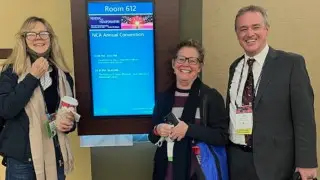A Semester of Scholarship – An Interview with Jon Radwan - Seton Hall University
Wednesday, January 26, 2022
Seton Hall professors are busy! In addition to teaching and service roles, most faculty are also responsible for maintaining an active research agenda. For instance, the most recent issue of American Journalism includes a digital media review of Vatican News authored by Jon Radwan, director of the Institute for Communication and Religion (ICR), an inter-disciplinary research unit within the College of Communication and the Arts. The review is the latest work capping a productive Fall '21 semester. In a recent interview Radwan explained the new publication and pointed back across the Fall 2021 semester toward three other significant projects.

Dr. Ellen Gorsevski (Bowling Green State University), Dr. Dale Cyphert (University of Northern Iowa) and Jon Radwan (Seton Hall) briefly removed masks to smile for the press prior to their NCA panel on Ethics in Contact Rhetoric.
American Journalism is a scholarly journal produced by the American Journalism Historians Association. Radwan explained how "book reviews have always been an important section within professional periodicals. Academics explaining and recommending books to other scholars is central in forming our disciplinary communities. To adapt to our online world, the editors at American Journalism recently added 'digital media reviews' of important news-oriented websites, productions and archives alongside book reviews." Radwan's piece explains Vatican News, the online news and evangelism portal run by the Vatican City State's Dicastery for Communication in the name of Pope Francis. "One of my main points is the value of journalistic pluralism," Radwan said. "Our world and especially our media-sphere are wonderfully complex, so we need to engage many sources. For devout audiences Vatican News works best as a center, not a limit. Read news from the center to the edges because knowledge requires perspective and collaboration."
From here, Radwan went on to recount earlier events in the semester. In November, the National Communication Association held their 107th annual conference. The conference was twofold, with a virtual Spiritual Communication Division meeting to recognize award recipients plus an in-person conference for new research. At the virtual meeting on November 12, six undergraduate students from Radwan's Spring 2020 "Communication in Abrahamic Religions" course were honored with the Outstanding Undergraduate Scholarship award for their work on topics including Jesus' communication model and the interpersonal power dynamics and social class structures within sacred texts.
Radwan also participated in the in-person conference in Seattle, Washington, presenting work on contact rhetoric to the Communication Ethics division. He explained how a critical grammar using vocabulary from Dance - space, time, weight, and flow – can map ethical communication patterns. To illustrate contact rhetoric, he chose Antonio de Montesinos's historic human rights sermon 'Ego vox clamante in deserto.' The colonial period began with brutal slavery for Hispaniola's (present-day Haiti and Dominican Republic) indigenous Taino people, but upon arrival in 1511 Antonio and the Dominican friars quickly recognized the island’s new labor dynamic as "mortal sin." "Montesinos spoke in a strong prophetic voice of judgement against the entire congregation of powerful colonists," Radwan explained. "His contact terms are central. Montesinos accused them all, saying 'How do you have them so oppressed and tired without giving them [anything] to eat or curing them in their illnesses, which from the excessive works you give them they incur and they die, or better said, you kill them, to draw out and acquire gold each day?' By identifying resource exploitation with bodily exploitation Montesinos made a powerful attempt to wake colonists from their "profoundly lethargic moral slumber." Montesinos asked his audience how they, as Christians, couldn't "feel" that slavery was wrong.
This past October, Radwan, Cooperman/Ross Endowed Chair for Jewish-Christian Studies Rabbi Alan Brill, Ph.D. and Assistant Professor of Communication Ruth Tsuria, Ph.D. submitted a grant proposal to the university's Academy initiative. This proposal secured funding for a podcast series called COREcast, which will be hosted through the ICR Podcasting Network. This network hosts its own Institute for Communication and Religion channel, sharing scholarly perspectives on how faith traditions contribute to and are influenced by contemporary society. The second channel is Inter/Sections, a partnership with the Journal of Inter-religious Studies exploring inter-faith conversations, ideas, and practices. The new COREcast series is designed to supplement two courses taken by all Seton Hall undergraduates, Journey of Transformation and Christianity and Culture in Dialogue. It is projected to produce at least eight episodes across three years and will place a faculty expert together with a student representative from a campus religious organization to discuss a required Core text they both care about. Faculty and students interested in participating should contact Jon Radwan.
Finally, the Fall 2021 semester began with the 81st annual meeting of the Academy of Management. The Academy is the primary professional association for management and organization scholars. For '21, Professor A.D. Amar, Ph.D. of the Stillman School of Business proposed a DEI-oriented panel, including Radwan's scholarship, to the Management Religion and Spirituality division. Radwan spoke on "Racial Justice Rhetoric at Work: Equality & Example in the Bhagavad Gita," using the ancient text to contextualize the rhetorical construction of race. Radwan's work points to the Bhagavad Gita's teaching on social structure. Ancient cultures differentiated between peoples, but race as a concept was not developed until the modern era. The Gita recognizes a social caste system, not race. Social stratification is seen as another earthly reality to be transcended, rather than a value to be accepted and reinforced. Radwan explained how, "in managerial communication especially" perceived divisions must be overcome to develop ethical workplaces.
ICR work will continue at a similar pace in Spring 2022. "New projects include an article on Pope Francis co-authored with Roger Alfani, PhD, an Inter/Sections podcast episode on race and religion featuring Khyati Joshi, PhD, of Fairleigh Dickinson University, plus our oral history grant proposal revisions," Radwan explained. At press time he was preparing a presentation with Todd Stockdale, PhD, for Seton Hall's Martin Luther King Jr. Day Symposium. "One of my points is about Howard Thurmond's influence on MLK. His spiritual perspective on communication reminds us all that speech is an incredibly powerful divine gift. 'Do not be silent; there is no limit to the power that may be released through you.'"
About the Institute for Communication and Religion
Launched in Fall 2017, the Institute for Communication and Religion within the College of Communication and the Arts provides a nexus for ongoing scholarly exploration of communication topics critically
important to religion and society. Guided by the spirit of ecumenical and interreligious
cooperation, the Institute seeks to engage in public dialogue and debate, promote
academic inquiry and support the religious dimension of creativity — all while upholding
the values of servant leadership, curricular innovation and intellectual excellence.
For more information on click here to visit the Institute for Communication and Religion.
Categories: Arts and Culture






